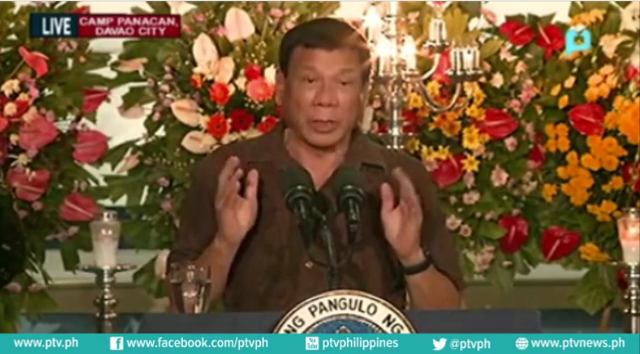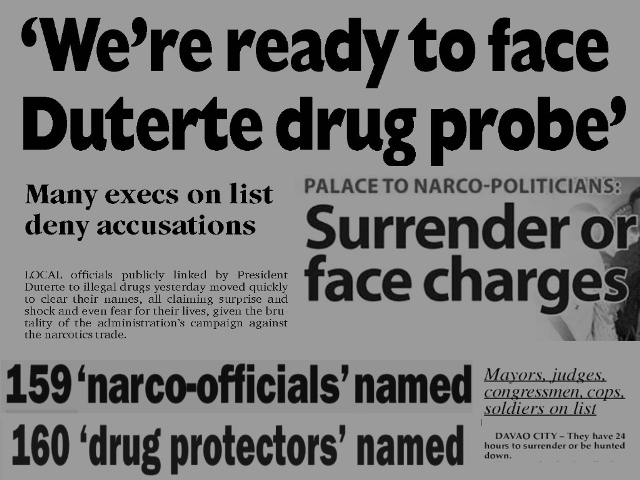Guilty Until Proven Innocent: Media as Unwitting Accessory

President Rodrigo Duterte announcing the list of alleged drug suspects during the wake of four soldiers in Camp Panacan, Davao City. Sceengrab from PTV-4 official Facebook account.
WHEN PRESIDENT Rodrigo Duterte made public the list of local government officials, judges and law enforcers allegedly involved in the drug trade, he did so with the caveat, that their involvement in the drug trade “might be true or might not be true ” – saying also that he hoped criminal or administrative charges would be filed against them.
The president releasing these names before the charges have been validated does not make the practice right. It destroys the reputation of those who are innocent and exposes those named as targets for killing.
The media went ahead anyway and published the list, without examining for themselves the validity of the list or the basis of the inclusion of the names. Publishing the names of people who have not been charged with any crime subjected them to trial by publicity and violated the fundamental right to presumption of innocence.
In this particular case, it also undermined the journalistic responsibility of verification since the names were published even though the president had raised doubts about the truthfulness of the list.
Clearly, a free press is not obliged to publicize everything that the president says or does, because this is not the purpose of press freedom. Since this president has shown little respect for due process nor seems to care about the damage negative impact of his speech or actions, the media need to exercise greater discernment about the reporting the president’s every move and statement.
Some of those named in fact turned out to be either dead or to have been inaccurately identified as to their positions in government. Some personalities in the current administration insisted on the list’s credibility by saying that it was actually a combination of old and new lists provided by intelligence reports, and that death, resignation or dismissal from office cannot change their alleged involvement in the drug trade at some point. But even Director General Ronald dela Rosa, chief of the Philippine National Police, admitted that there was not enough evidence against those in the list, thus raising the question of why it was even released in the first place.

A few news organizations did do the responsible thing: they either refrained from publishing the names or, without publishing the list, also checked the status of some persons in it. These organizations include BusinessMirror; Malaya Business Insight; The Daily Tribune; VERA Files; Philippine Center for Investigative Journalism (PCIJ); and local media organizations Sun.Star and Mindanao Gold Star Daily.
In “Media Frenzy: Covering the Visconde Murders” (1995), CMFR noted that the sensational case produced false leads and misleading information which appeared as legitimate and established facts. According to that monitor, “Journalists often reported information they had not had the time to evaluate or to check with another source. Yet, where it involves determining the guilt or innocence of individuals, the press must limit itself to verified information or evidence validated by due process.”
The administration has promised the release of a second “narco-list”. The drug problem is an issue of great public concern and the response to it must be based on a comprehensive strategy. Pandering to the administration’s guilty-until-proven-innocent approach to the anti-drug campaign does not speak well of the press. It reduces the press as a presidential tool, serving not public interest but transforming its function to serve as an instrument of government.
Some members of the press seem to have forgotten that there are reasons behind the need for journalistic skepticism when reporting uncorroborated information, especially when people’s reputations and lives are involved.
Leave a Reply